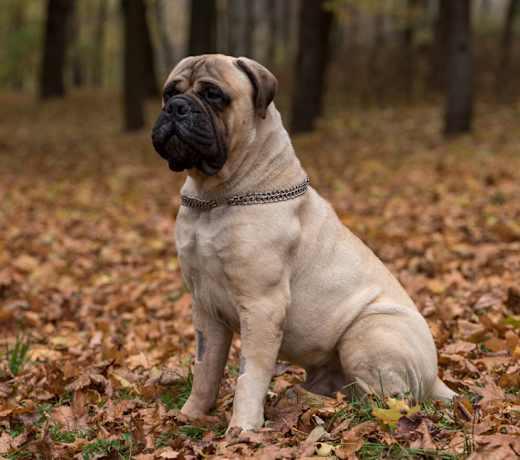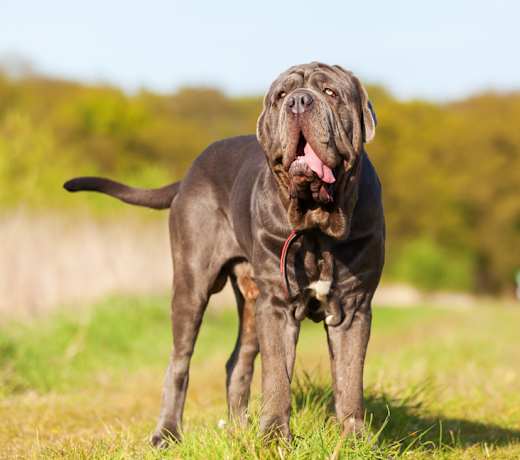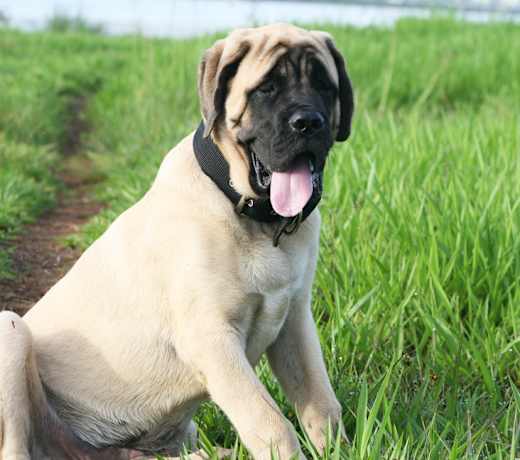Dogue de Bordeaux dogs are large, muscular, and powerful dogs. They are typically 23 to 27 inches tall at the shoulder and weigh 93 to 151 pounds on average. Females are generally 23 to 26 inches tall and weigh 93 to 130 pounds on average.
Dogue de Bordeaux
Breed Type: Working
Common nicknames: French Mastiff, Bordeaux Dog
Coat: Smooth
Hypoallergenic: No, they will likely trigger allergies.
Temperament: Friendly, affectionate, gentle, patient
Life expectancy: 5-10 years
Color & patterns: Mahogany
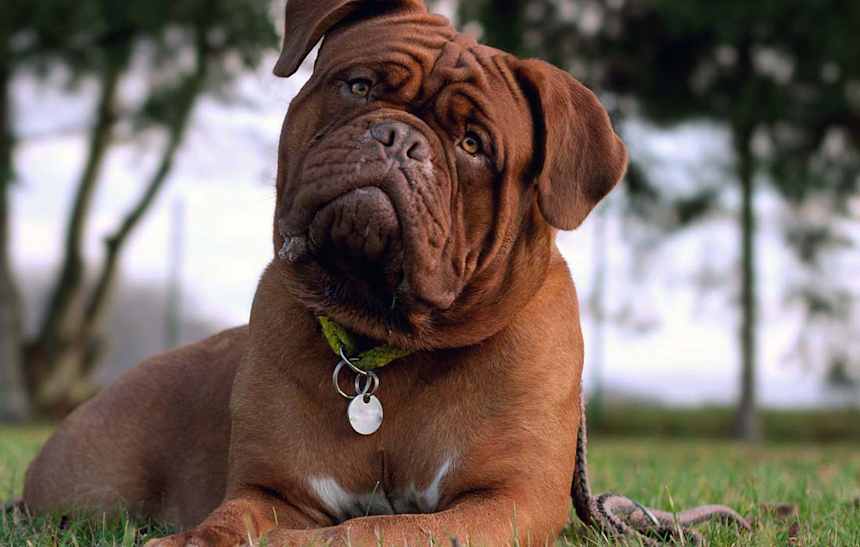
The Dogue De Bordeaux is a large, muscle-packed breed that may sport a serious “don’t mess with me” look but is really just a marshmallow just waiting for a cuddle. With their deep-set eyes and expressive wrinkles, the Dogue De Bordeaux pulls off an endearing combination of world-weary wisdom and wide-eyed innocence that can melt the coldest of hearts. These dogs were originally bred to guard, hunt, and fight, but nowadays, they prefer to spend their days snoozing in the sun, enjoying leisurely strolls, and offering you friendly, slobbery greetings when you get home from work. So, if you’re seeking a perpetually squishy-faced friend, say bonjour to the Dogue De Bordeaux.
Dogue de Bordeaux characteristics
Learn about about Dogue de Bordeaux basics like their fur colors, shedding levels, how much grooming they need, and other Dogue de Bordeaux facts.
Average height
23-27 inches (58.4-68.6cm)
Average weight
93-151 pounds (42.2-68.5 kg)
Average lifespan
5-10 years
Exercise needs
Grooming needs
Full-grown size
Good with cats
Good with kids
Training aptitude
When do Dogues de Bordeaux stop growing?
Dogues de Bordeaux typically stop growing in height by around 18 to 24 months of age, but they continue to fill out and gain muscle mass until they are about two-and-a-half to three years old.
How long do Dogues de Bordeaux live?
Dogues de Bordeaux live five to eight years on average, mostly due to their large size, which often correlates with a shorter lifespan in dogs. However, with proper care, some Dogues de Bordeaux can live longer, reaching up to 10 years or more.
What colors do Dogues de Bordeaux come in?
Dogues de Bordeaux come in fawn (ranging from a dark red fawn to a light fawn), mahogany, isabella, and red, according to the breed standard.
Do Dogues de Bordeaux shed?
Yes, Dogues de Bordeaux shed. Their short, dense coat sheds year-round, but the amount of hair lost is usually moderate compared to breeds with longer or thicker coats. There might be slightly increased shedding during seasonal changes in spring and fall.
Dogue de Bordeaux temperament
Learn about about the Dogue de Bordeaux temperament and how well they fit into your lifestyle, home environment, and family.
Are Dogues de Bordeaux good with kids?
Yes, Dogues de Bordeaux are good with kids. Described as gentle giants, many Dogues de Bordeaux are patient with and tolerant of children, making them suitable for families with kids. They are very loyal to their family and will look out for the well-being of their younger human companions.
As with any breed, it’s important to supervise interactions between Dogues de Bordeaux and young children to ensure that play is safe and respectful. These large dogs might not always be aware of their size and strength, which can accidentally lead to accidental bumps or knockdowns.
Pet parents should invest time, proper training, and early socialization in their dogs so that they'll get along well with children. Teaching children how to properly approach and handle dogs is also crucial to ensure positive experiences for both the dog and the child.
Are Dogues de Bordeaux good with other dogs?
Yes, Dogues de Bordeaux can be good with other dogs when they are properly socialized and trained. Their gentle and loyal nature often facilitates good relationships with canine companions. Their natural protective instincts can extend to other dogs they consider part of their family.
However, each Dogue de Bordeaux has their own personality. Some might be more dominant or reserved around other dogs. Proper early socialization is crucial to prevent aggressive behaviors. Introducing a Dogue de Bordeaux to a variety of other dogs in different environments helps them learn how to interact appropriately.
Are Dogues de Bordeaux good with cats?
Dogues de Bordeaux can be good with cats, but a successful relationship largely depends on the individual dog’s temperament, socialization, and training. Many Dogues de Bordeaux are known for their gentle and patient demeanor, which can contribute to positive interactions with cats. They might develop a strong bond with a cat they grow up with.
That said, each Dogue de Bordeaux has its own personality. Some may be more tolerant and accepting of cats, while others might have a stronger prey drive. Introducing a Dogue de Bordeaux to cats at a young age and ensuring positive, supervised interactions can help them learn to coexist peacefully.
Do Dogues de Bordeaux bark?
Yes, Dogues de Bordeaux bark, but they are not usually excessive barkers. Dogues de Bordeaux have strong protective instincts and will bark to alert to any unusual activity or unfamiliar people or animals approaching their territory. They might also bark to get attention, express boredom, or signal that they need something, such as a walk or playtime.
Are Dogues de Bordeaux friendly?
Yes, Dogues de Bordeaux are friendly and affectionate, especially with their family members. They are typically friendly with people they know and can be welcoming to new guests if they have been properly socialized from a young age. Exposure to different people, animals, and environments helps them develop a balanced and friendly temperament.
Are Dogues de Bordeaux easy to train?
Yes, Dogues de Bordeaux can be relatively easy to train, but their training experience can vary depending on the individual dog — and it’s important to remember that training any dog takes substantial time and effort, regardless of breed.
Dogues de Bordeaux are intelligent dogs and can learn commands and tasks effectively when training is properly approached. They tend to be quick learners, especially when motivated by rewards. Their loyalty to their pet parents can make them eager to please, which can facilitate training.
Consistency is key when training a Dogue de Bordeaux. They respond well to clear, consistent commands and routines. Dogues de Bordeaux respect a confident, assertive leader. They thrive in an environment where they understand their place in the household hierarchy, but this should be established through positive means rather than intimidation.
Are Dogues de Bordeaux smart?
Yes, Dogues de Bordeaux are smart dogs. Dogues de Bordeaux can learn commands and tasks fairly quickly. Their intelligence allows them to pick up on cues and instructions effectively. They can solve problems and navigate their environments well, which is a sign of their cognitive abilities. They can understand and remember commands, routines, and their surroundings.
Although they are smart, they can also be somewhat stubborn or independent. Training requires patience and consistency. Positive reinforcement works best, and harsh methods can lead to resistance.
Are Dogues de Bordeaux good family dogs?
Yes, Dogues de Bordeaux are good family dogs. Their temperament and characteristics make them well-suited for family life. Despite their large size and imposing appearance, they are usually gentle, patient, and can be good companions. They are very protective of their family and home, which adds a layer of security.
Proper training and socialization from an early age are important to ensure that the Dogue de Bordeaux is well-behaved and integrates well into family life. They benefit from clear rules and consistent training. Given their large size, they need ample space to move around comfortably. They are not ideal for very small living spaces, such as apartments, unless there are regular opportunities for outdoor exercise.
Dogue de Bordeaux history
Learn about where the Dogue de Bordeaux came from.
Where are Dogues de Bordeaux from?
Dogue de Bordeaux is from France. This ancient breed, also known as the French Mastiff, is one of the oldest French dog breeds, dating back over 600 years. The Dogue de Bordeaux was traditionally used for a variety of tasks, including guarding homes, protecting livestock, and pulling carts.
Dogue de Bordeaux health
Learn about about the Dogue de Bordeaux health outlook and what diseases they may be prone to at various stages of their life.
Are Dogues de Bordeaux healthy?
Dogues de Bordeaux can be healthy, but their large size and breed-specific traits make them prone to certain health issues. The average lifespan of a Dogue de Bordeaux is around five to eight years, which is relatively short, even for a large breed. Regular veterinary care, proper nutrition, exercise, and grooming are crucial for maintaining their health and quality of life.
What diseases are Dogues de Bordeaux prone to?
Dogues de Bordeaux, like many large breeds, are prone to specific health issues due to their large size and breed characteristics, including:
Hip dysplasia: This is a common condition in large breeds in which the hip joint doesn’t fit into the hip socket properly, leading to arthritis and pain.
Elbow dysplasia: Elbow dysplasia is known to affect large and giant breeds more frequently. Dogs with elbow dysplasia often show signs of lameness in one or both front legs, which might worsen with activity.
Aortic stenosis: Aortic stenosis is an inherited heart condition that occurs when a dog is born with an abnormally narrow aortic valve. The aortic valve controls blood flow from the left ventricle to the aorta. The narrowing makes it difficult for blood to flow properly through the heart and can cause fainting and even sudden death. Your vet can detect it and prescribe the proper treatment.
Dilated cardiomyopathy (DCM): Dilated Cardiomyopathy is a heart condition that is characterized by the heart muscles’ inability to contract properly, which ultimately leads to a decrease in blood pumping to the heart. When a dog has cardiomyopathy both the heart chambers become enlarged from having to work harder to get blood through. The extra stress on the heart from the restricted blood flow often leads to congestive heart failure. The major symptoms of DCM include lethargy, anorexia, rapid breathing, shortness of breath, coughing, a swollen abdomen, and temporary loss of consciousness.
Bloat (gastric dilatation-volvulus): Large breeds with deep chests are prone to bloat, a condition where the stomach fills with gas and can twist. This is a serious emergency and requires immediate veterinary attention.
Skin issues: The folds and wrinkles on a Dogue de Bordeaux’s face can trap moisture and debris, leading to bacterial or fungal infections. These dogs can also develop itchy skin due to allergies and hot spots.
Respiratory issues: Due to their short muzzle and large size, Dogues de Bordeaux can be prone to breathing difficulties, especially in hot or humid conditions.
Popular Dogue de Bordeaux mixes
Dogues de Bordeaux are sometimes mixed with other breeds which often combine the physical characteristics, temperament, and health traits of both parent breeds. Here are some common Dogue de Bordeaux mixes:
Bordeaux Pitbull (Dogue de Bordeaux + American Pit Bull Terrier)
Bordog or Bordeaux Bulldog (Dogue de Bordeaux + American Bulldog)
Boxer Bordeaux (Dogue de Bordeaux + Boxer)
Mastibull or Bordeaux Mastiff (Dogue de Bordeaux + Mastiff)
Bordeweiler or French Rottie (Dogue de Bordeaux + Rottweiler)
Great Bordeaux or Bordeaux Dane (Dogue de Bordeaux + Great Dane)
Labradog (Dogue de Bordeaux + Labrador Retriever)
Bordeherd (Dogue de Bordeaux + German Shepherd)
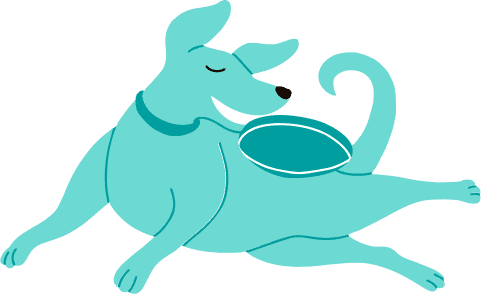
Find Dogue de Bordeaux puppies near you
Adopting a Dogue de Bordeaux
We don't see any Dogues de Bordeaux available for adoption in your exact location or cities near you, but here are some adorable similar breeds in Beverly Hills, CA.
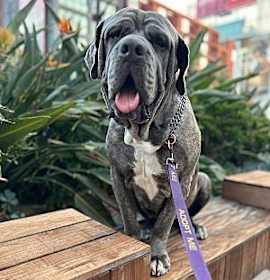
Zen
Neapolitan Mastiff Mastiff
Male, 5 yrs 2 mos
Beverly Hills, CA
Good with dogs
Not good with cats
Needs experienced adopter
House-trained
Spayed or Neutered
Shots are up-to-date
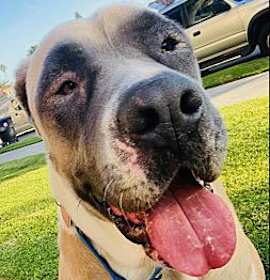
Sabrina
Mastiff American Bulldog
Female, 7 yrs 3 mos
Beverly Hills, CA
Needs experienced adopter
House-trained
Spayed or Neutered
Shots are up-to-date
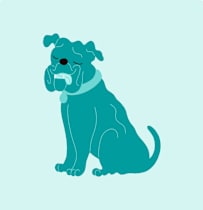
Norris
Mastiff
Male, 11 mos
Los Angeles, CA

Nolan
Mastiff
Male, 6 yrs 5 mos
Los Angeles, CA
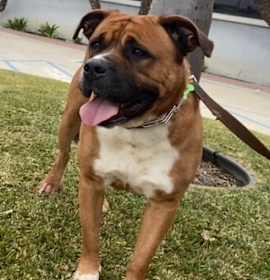
Uki
Mastiff Boxer
Female, 5 yrs
West Los Angeles, CA
Good with dogs
House-trained
Spayed or Neutered
Shots are up-to-date

GOGGLES
Mastiff
Male, 1 yr 2 mos
Los Angeles, CA

Ozzy
Mastiff
Male, 7 mos
Los Angeles, CA
Good with dogs
House-trained
Shots are up-to-date

Robbie
Mastiff Doberman Pinscher
Male, puppy
Los Angeles, CA
Good with dogs
Good with cats
House-trained
Spayed or Neutered
Shots are up-to-date

Zen
Neapolitan Mastiff Mastiff
Male, 5 yrs 2 mos
Beverly Hills, CA
Good with dogs
Not good with cats
Needs experienced adopter
House-trained
Spayed or Neutered
Shots are up-to-date

Sabrina
Mastiff American Bulldog
Female, 7 yrs 3 mos
Beverly Hills, CA
Needs experienced adopter
House-trained
Spayed or Neutered
Shots are up-to-date

Norris
Mastiff
Male, 11 mos
Los Angeles, CA

Nolan
Mastiff
Male, 6 yrs 5 mos
Los Angeles, CA

Uki
Mastiff Boxer
Female, 5 yrs
West Los Angeles, CA
Good with dogs
House-trained
Spayed or Neutered
Shots are up-to-date

GOGGLES
Mastiff
Male, 1 yr 2 mos
Los Angeles, CA

